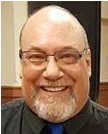Roger LaPlante is running for Apple Valley Town Council, he said, “because the residents need new pragmatic leadership in order to reform our local government so it can work better for the residents and not the special interest groups.”
His experience in government puts him in good stead to assume a position on the town council, LaPlante said. “My government career spans over 20 years in service with the U.S. Army and The Department of Veterans Affairs. I am an experienced small business owner.”
He is easily distinguished from some of the council incumbents, LaPlante said, by not being in a position to profit personally from being a town official.
“I will never have to recuse myself from voting because I have zero conflicts of interest in town business,” he said.
The major issue facing the community at this time, LaPlante said, is “the town’s fiscal responsibility to the residents.”
Beyond that, he believes the council should prioritize sustaining the long time commitment Apple Valley has in precluding developers from constructing homes on lots anything less than one-half acre. The city upon its foundation in 1988 had set a one-half acre minimum lot size. This led to protests from the development industry, but both residents and prevailing elected officials were committed to the generous-size residential lot concept, believing it preserved the quality of life in Apple Valley and distinguished it from other cities that were dominated by the demands of the development community, which once in control pushed for ever smaller lot sizes, resulting in as many as a dozen or 14 residential units being packed onto a single acre. By the late 1990s, the troika of David Holman, Barbara Loux and Patrick Jacobo, all of whom had ties to the development community, were elected to the council. They made a push to reduce the town’s standards to allow four residential units to the acre as a prelude to even further density concessions. This triggered a counterreaction from among town residents, resulting in a committee qualifying a recall election against Holman, Loux and Jacobo and placing on the same ballot Measure N, which mandated that until December 31, 2020 the “existing rural atmosphere and equestrian lifestyle” of Apple Valley would be respected by requiring a vote of the people on any amendment to the single-family residential element of the town’s general plan, thus safeguarding Apple Valley’s tradition of half-acre lots. That election was held on November 2, 1999. Measure N, passed by more than 83 percent, while 89 percent of the town’s voters chose to remove Holman, Loux and Jacobo from office in favor of Ted Burgnon, Tim Jasper and Michael Risley, all three advocates of Apple Valley’s half-acre lot size minimum. With Measure N’s provisions due to sunset in a little more than two years, efforts were made to get the current council to put a replicant measure on the ballot this year to perpetuate the half-acre minimum lot size another two decades. Incumbent council members Larry Cusack, Scott Nassif and Curt Emick, as well as Mayor Art Bishop balked at doing so, leading some to suspect that the development industry has made inroads with them to allow Apple Valley to shrink lot sizes to as small as an eighth of an acre in Apple Valley beginning in 2021.
LaPlante said the council should quit temporizing with regard to the issue and recommit the town to keeping its quality of life intact. He called for “putting Measure N back on the ballot before it is due to sunset in order to keep our lot sizes at one house per half acre. We need to agendize Measure N.”
LaPlante said he also sees “public safety and homelessness as significant issues” in Apple Valley.
LaPlante further identified water conservation as a priority for the town. “If elected, I will work diligently to conserve our water and advocate for fair rates for residential homes and businesses,” he said.
LaPlante called for “the reduction of overpaid administration salaries.”
He said, “We should allocate more funds to increase public safety.”
A fiscal conservative who is against raising taxes, LaPlante said the town, if managed properly “will pay for our “Better Way of Life” by bringing in new pioneering businesses to the north Apple Valley freeway corridor and through the revitalization of the Village without eating up taxpayers’ dollars. We can make ends meet and balance our budget by cutting out waste and creating a business-friendly community.”
At present, LaPlante is the executive board representative to the California Democratic Party for the party’s delegates in the 33rd Assembly District and the San Bernardino County Democratic Party’s voter registration committee chairman. He has a medical retirement from the United States Army and the Veterans Administration after a 20-plus year career in the military, during which he had assignments around the globe.
“I come from a proud family that has been involved in public service since World War II, when my father served the United States in the South Pacific with the U.S. Navy,” LaPlante said. “I was also a combat veteran of the 1st Inf Div Big Red 1 Iraq in 1991. In 1985 I served in the NATO European theater of operations in the Cold War.”
A graduate of Northwest High School in Indiana, LaPlante told the Sentinel, “I used my GI Bill benefits to earn two degrees from Victor Valley College, majoring in automotive engineering.”
LaPlante has a 29-year-old son, Jeffrey, and daughter-in-law, Diana.
More can be gleaned about LaPlante and his candidacy at his website, rlaplante.com, and on Facebook.
-M.G.

